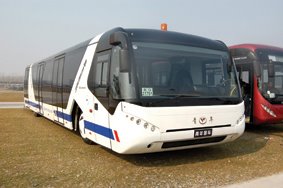 Youngman Automobile Group, a prominent Chinese bus and coach manufacturer, has announced plans to ship 1,000 high quality German technology-based CNG buses to the US within the next 12 months.
Youngman Automobile Group, a prominent Chinese bus and coach manufacturer, has announced plans to ship 1,000 high quality German technology-based CNG buses to the US within the next 12 months. Following the announcement, ZAP has been appointed as the exclusive importer and distributor of these buses within North America. Lotus Engineering Inc., the US-based subsidiary of Lotus Engineering of the UK, will be leading the homologation and US certification process, which is expected to take a few months to complete. The company expects to deliver its first shipment by the fourth quarter of 2008 under the ZAP brand.
“For the last 14 years we have been building luxury motor coaches based on German standards of quality in partnership with Neoplan, and we are No.1 in our domestic market,” said Mr. Pang Qingnian, Chairman and President of China Youngman Automobile Group. “Now for the last four years we have managed to penetrate into the international market, selling in countries like Singapore, Hong Kong, Korea, Europe and the Middle East. The US is one of the last and prize trophies for us. With Chinese-based economics and German-based quality, I believe our buses offer the best quality at half the price.”
Youngman Automobile Group and ZAP also plan to open an assembly plant to carry out the final assembly in California, creating green collar jobs for the US.
“Our meeting with ZAP and the Governor of California in October last has convinced me that this partnership goes beyond just selling buses to the US. We can leverage the skilled workforce in the US to deliver the highest quality products. We shall manufacture and produce the components for these products in China and have them assembled in the US, a business model that allows us to enjoy the best economics as well as being part of this green movement in the heart of California,” Mr. Pang added.
Depending on the final vehicle specifications, ZAP expects to price these buses between $175,000 and $230,000, typically half the price of comparable buses in the US market.
“We have spent the last six months organizing and forging a number of strategic partnership deals and really have some strong people supporting us now. In the past, we have failed to gain significant traction, but I believe we have learned and are ready to embrace these new changes. The chance to distribute this quality of buses at a competitive price would bring significant benefits to our customers and shareholders. We have already started discussions to recruit creditable distribution partners within the US, and I envision there to be significant growth potential for these buses”, said ZAP CEO Steve Schneider.
Youngman’s engineers would be working with the engineering team from Lotus Engineering to ensure the products meet the certification requirement for the US market. The team would be working on a 12-metre CNG bus as its product to hit the US market. Since this is a quality product based on German technology and engineering, officials believe the certification and homologation should be a smooth process.
Said Don Graunstadt, CEO of Lotus Engineering Inc., based in the Detroit area: “Youngman Automobile Group is a strategic partner of Lotus Engineering with a number of projects being carried out in the UK, Malaysia and China. I am proud to have a chance to assist the Youngman Group from the US. Through its relationship with Neoplan, Youngman has experience with the US homologation process. So we expect the homologation and certification for this bus will be relatively straightforward.
Youngman recently introduced advanced manufacturing technology in its facilities jointly with Neoplan of Germany. Youngman’s manufacturing is based on the ISO 9001 international standard of quality for its bus production.
The manufacturing facility in Jinhua covers an area of over four million sq. feet. Youngman employs 4,000 persons, including 700 research and development staff. With seven production facilities in process, the company expects to soon have the capacity to produce 200,000 vehicles per year, including a capacity to build 10,000 buses.